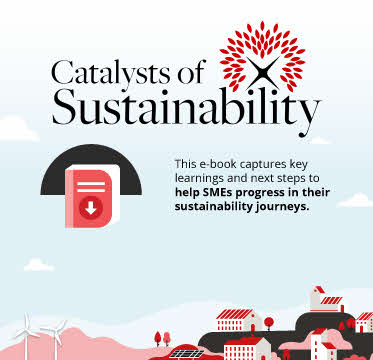Embracing sustainability with the right resources

Small and medium-sized enterprises (SMEs) play a crucial role in driving positive social and environmental impact around the world. As significant contributors to global economies, these businesses can potentially lead the transition to a net-zero emissions world. However, they face numerous challenges in decarbonising their operations due to limited resources, including financial and human capital.
At the Disrupt – The Future of Sustainability event by DBS BusinessClass held on March 23, sustainability experts and SME owners discussed the challenges and potential solutions for SMEs to embark on their decarbonisation journeys. The event also saw the launch of the Catalysts of Sustainability e-book. Produced jointly by DBS and Bloomberg Media Studios, the e-book offers relevant insights and proposes next steps to assist SMEs in their sustainability journeys.
A panel session moderated by John Phillips, Executive Editor, Bloomberg Media Studios (APAC), highlighted the increasing pressure SMEs face to go green from their supply chain ecosystem, which often includes large corporates that have already adopted ESG strategies and standards. Against this backdrop, the panellists noted that SMEs need strong support to address complex sustainability challenges.
As one of the world’s leading integrated agricultural commodity and food solutions providers, Agrocorp International has embraced sustainability in its core businesses with guidance from its EHS (environmental, health and safety) policy. On a day-to-day basis, the team is encouraged to find ways to reduce negative environmental impact and enhance positive ethical impact of our operations. However, there are challenges along the way, for example, keeping costs manageable while meeting sustainability goals, as well as meeting ESG reporting requirements.
“The SME culture is all about the hustle. So while we are hyper focused on our business activities, ESG demands that you take a step back and look at a bigger picture in terms of your strategy and your policies and procedures,” said Abhinav Vijay, Head of Sustainability at Agrocorp. While SMEs can seek advice from external consultants to help them, choosing the right advisors is yet another issue, he added.
SC Auto Industries, another panellist, has focused on sustainability in recent years in response to the global trend towards green mobility. The homegrown company, which specialises in designing and manufacturing high-quality buses, is one of the partners behind Singapore’s first electric bus. Rachel Lee, Managing Director at SC Auto Industries, noted that being able to quickly transform the mindset of the company's employees is one key obstacle on their road to becoming a sustainable organisation.
“If we want to survive in the next 20 to 30 years, we have to respond to the changing environment. And so we have to be part of the ecosystem to support our nation's emissions targets,” said Lee. “The challenge we face is: How do we transform the skillsets of our employees in a short period of time so that everyone is aligned in the same direction?”
On this front, companies like SC Auto can tap on government agency SkillsFuture Singapore’s schemes to develop pivotal skills of their workforce in the areas of sustainability and other emerging needs. Acknowledging that investing in skills upgrading is not a natural priority for SMEs, Peggy Lim, Director of Enterprise Engagement Division, SkillsFuture Singapore shared that skilling is becoming a critical business agenda that SMEs can no longer ignore because of increasingly stringent ESG standards. She further shared that SkillsFuture Singapore recently launched the “Skills Demand for Future Economy” report spotlighting in-demand and transferable skills for the green economy, including roles in environment and sustainability management, energy resource security and decarbonisation, green infrastructure and mobility, and sustainable finance.
SkillsFuture Singapore recently launched a report highlighting the most important skills for the green economy, including roles in environment and sustainability management, energy resource security and decarbonisation, green infrastructure and mobility, and sustainable finance.
To help SMEs upskill, DBS together with SkillsFuture Singapore has launched the DBS SME Skills Booster programme under the SkillsFuture Queen Bee network. Committed to help companies kick-start their sustainability journey and yield better returns on their sustainability initiatives, DBS is curating more courses for SMEs to acquire knowledge to implement and operationalise sustainable practices, address new ESG demands, and generate impact.
Solutions designed for SMEs
To help SMEs progress on their low-carbon transition, DBS offers a suite of solutions tailor-made for these often resource-strapped businesses. “SMEs typically have limited resources, but we know that many of them want to do the right thing. So my view has always been to find practical solutions that are easy to implement; almost like a turnkey solution that is plug and play. These solutions run on their own but yet you can harness the ESG benefits from them,” said Coby Wong, Senior Vice President, Sustainability, Institutional Banking Group, DBS Bank.
She advised SMEs to kickstart their sustainability journey with small steps that are relevant to their businesses, and material to the bottom line. “This can help to motivate and start the journey, and with some form of return as well. That hopefully will eliminate some hesitance and allow you to open new conversations with your customers and buyers.”
Watch the panel session below and download the Catalysts of Sustainability e-book here.
Stay updated with latest industry trends and insights and gain access to exclusive event invitations by subscribing to DBS BusinessClass here.



